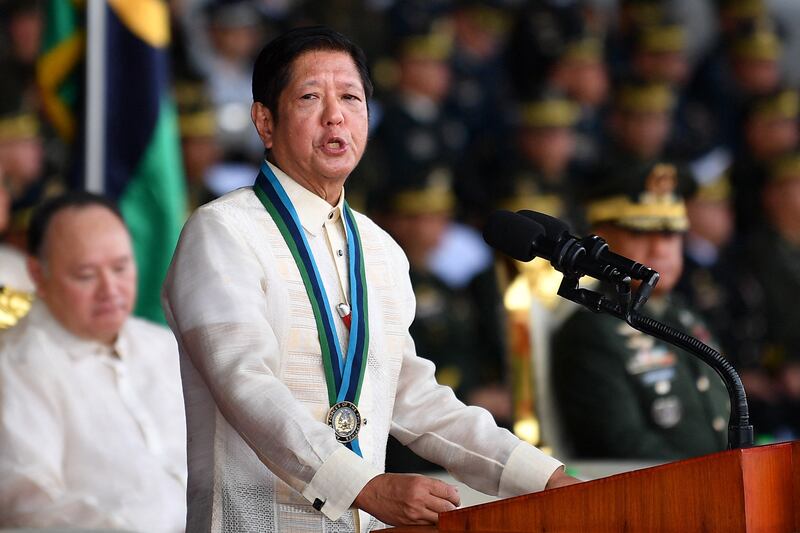Most Filipinos prefer to elect leaders who would defend the Philippines and take a strong stand against China’s aggressiveness in the South China Sea, according to results of a new survey.
Pollster Social Weather Stations (SWS) found overwhelming public support for candidates who would assert Philippine sovereignty, with 78% of respondents favoring candidates who would confront Beijing's activities in the contested sea region.
In May, Filipinos will go to the polls for mid-term elections across their archipelago nation. The Stratbase ADR Institute, a think-tank, commissioned the survey, which was conducted from Feb. 15-19 through face-to-face interviews with 1,800 registered voters nationwide.
"[A]t least eight out of 10 Filipinos … would like to support candidates who will stand up for the sovereignty of the Filipino people," Dindo Manhit, president of the institute, said as he presented the survey findings at a Friday forum in Manila on security challenges facing the Philippines, Japan, and the United States.
A large majority who were surveyed, 77%, also supported the idea of strengthening alliances and joint military efforts to defend the Philippines’ territorial and economic interests in the South China Sea, he said.
It is also important for the Philippines to strengthen its defense alliances with the United States and Japan to ensure the enforcement of international law in the South China Sea, Manhit said.
“We know that we might not be as strong as we could be, but our strength is with our friends and allies,” he said.
RELATED STORIES
[ Philippine envoy: Manila’s defense alliance with Washington ‘remains intact’Opens in new window ]
In December, the Philippine Senate ratified a new defense treaty with Tokyo that would allow for larger-scale joint military drills and pave the way for military personnel to take part in security operations, including coordinated security patrols.
The Reciprocal Access Agreement will take hold once President Marcos signs off on it and the Japanese legislature ratifies it.
The Philippines has a similar pact with the United States, the Visiting Forces Agreement. It was signed in 1999 and sets the terms under which American military personnel can operate on Philippine soil.
The survey results came out as tensions between the Philippines and China remain high in the waterway.
Under his presidency, Philippine leader Ferdinand Marcos Jr. has rekindled the country’s alliances with the West, particularly with treaty ally United States – a sharp contrast to the policy of Rodrigo Duterte, his predecessor who was friendlier to Beijing.
“We won something on July 12, 2016 – not a piece of paper, but a basis to strengthen our alliances in the name of a rules-based order,” Manhit said, referring to a landmark international arbitration ruling that nullified Beijing’s sweeping maritime claims in the waters.
BenarNews reached out to China’s embassy in Manila, but officials did not immediately respond to requests for comment.
Beijing’s foreign minister had not yet responded to the latest survey findings.

The survey findings were also released two months before Filipinos will vote for a new set of leaders for the Senate, House of Representatives, and local government posts.
“Filipinos recognize that a firm and united approach – through diplomacy, military readiness, and strategic partnerships – is essential in safeguarding our territorial integrity,” Manhit said. “Japan, the Philippines, and the U.S. must deepen their strategic collaboration.”
However, Manhit noted that the new Trump administration in the United States “raises key questions about the future of U.S. engagement in the region.”
Some security experts had said earlier that President Donald Trump might pay less attention to Southeast Asia, particularly the Philippines, which has been working to shore up international support against China in the South China Sea.
Retired Navy Rear Adm. Rommel Jude Ong said the Trump administration had yet to clearly lay out its strategy in the region.
“What is the U.S. Indo-Pacific strategy? That’s the question mark,” he said during the forum on Friday.
“[N]owhere in the current narrative are we looking at something more holistic in terms of the region. That’s problematic. From what I see now, President Trump is looking first at his own backyard,” he said.
However, Ong praised Trump’s position on strengthening the U.S. Navy by, among other things, creating an Office of Shipbuilding within the White House.
In his joint address to the U.S. Congress on Tuesday, President Trump declared his plans to revive America's shipbuilding industry – including military shipbuilding – and the creation of the Office of Shipbuilding in the White House.
“[W]e will create a new Office of Shipbuilding in the White House and offer special tax incentives to bring this industry home to America, where it belongs,” Trump said.
With the South China Sea issue seen as a problem of “regional imbalance of naval power,” Ong said Trump’s pronouncement was a welcome development.
“We’re looking at [China] increasing coercive posture not only in the South China Sea but maybe in the East China Sea,” Ong said.“We’re [also] going to see an increase of Chinese footprint in the mid-Pacific, particularly in the Solomon Islands and Cook Islands,” Ong said.
